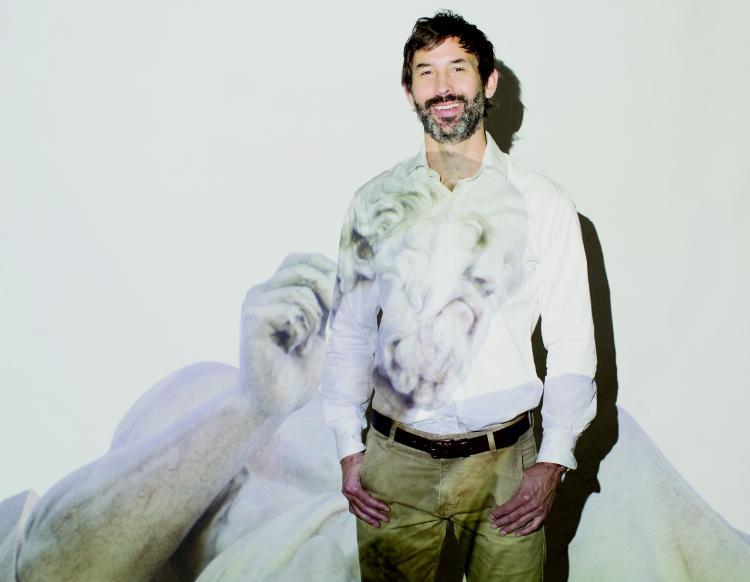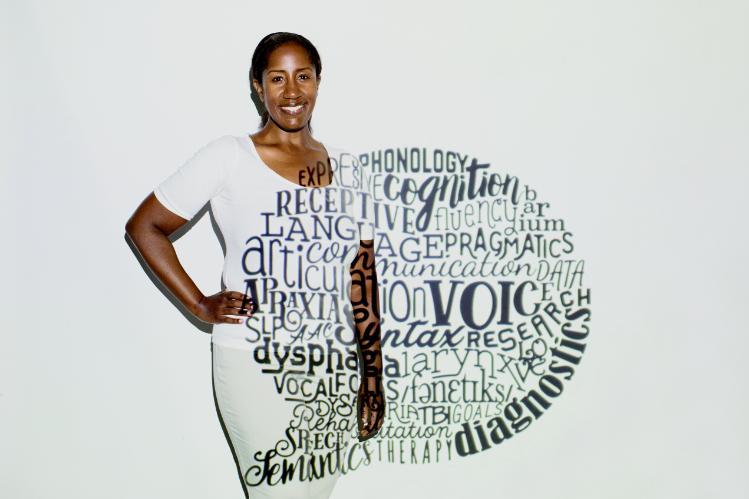The 27 new faces on Longwood’s campus this year have already proven their academic mettle at some of the world’s finest graduate programs. and, through their scholarship, they have already made important contributions to the body of human knowledge in everything from the economics of housing policy to strategies for teaching reading to the cognitive impairments that result from chemotherapy.
Just as impressive as their research—and a major factor in their decision to join the Longwood faculty—is their commitment to bringing what they’ve learned from it into the classroom, along with their enthusiasm for their subjects and their confidence in what their students can accomplish.
“These students are smart and motivated enough to do pretty much anything, and I hope to convince them of that,” said Dr. Thomas PlaHovinsak II, who is new to the economics faculty this year. “I chose Longwood because it seems to have an environment where faculty can get to know students in and out of the classroom, and help them grow and learn.”
Dr. Paul Chapman, dean of the College of Education and Human services, is impressed with the caliber of the new faculty across all disciplines.
“They are a stellar group. We’ve hired the best of a deep pool of qualified candidates,” he said. “They could have gone anywhere they wanted to go, and they came to Longwood.”
In the following pages you’ll find a quick profile of all new faculty, and you’ll get to know a few of them in a little more depth.
Cook-Cole College of Arts and Sciences
ANDREW CAMPBELL
Assistant Professor of Theatre
- Education: MFA, design, Temple University
- What he’s teaching: Issues in Theatre, Introduction to Technical Theatre, Properties Construction
- Research/scholarship: Campbell specializes in technical direction, and scenic and lighting design, in all levels of theatre and event production.
DR. SCOTT COOK
Assistant Professor of Leadership Studies and Political Science
- Education: Ph.D., Public Administration and Public Policy, Florida State University
- What he’s teaching: Public Administration, Leadership, International Security
- Research/scholarship: Cook researches the history of American government with a focus on the public service of George Washington. His work points to the lessons on administration, leadership, politics and citizenship that Washington’s words and actions provide.
DR. JACKIE DANIEL
Assistant Professor of Nursing
- Education: Doctor of Nursing Practice, Old Dominion University
- What she’s teaching: Nursing Care of Adults and Families, Internship to Nursing
- Research/scholarship: Dr. Daniel has researched how health-care providers manage testing and follow up for pap smear testing, which she said continues to be the best screening tool available to monitor cervical changes that can develop into cervical cancer.
DONOVAN DOUGLAS
Assistant Professor of Graphic and Animation Design
- Education: MFA, Animation and Visual Effects, Academy of Art University
- What he’s teaching: Handcraft and Color for Design, Animation and Simulation, Introduction to 3D Modeling, Interactive and Web Design
- Research/scholarship: Douglas’ research focuses on developing strategies to help students work most effectively and successfully with four common 3D modeling and animation software packages. “I want to help them learn how to quickly fix common mistakes and get the best and most professional results,” he said.
DR. MAXWELL HENNINGS
Assistant Professor of Psychology
- Education: Ph.D., Psychology, University of Maine
- What he’s teaching: Quantitative Methods, Introduction to Biopsychology
- Research/scholarship: Hennings investigates what is known as the “chemo-brain” phenomenon: the tendency for cancer survivors to experience long-term cognitive impairments as a result of chemotherapy treatment. He hopes to identify underlying mechanisms response for this condition.
DR. JILL PERTTULA
Assistant Professor of English Education
- Education: Ph.D., curriculum, instruction and the science of learning, and English education; University at Buffalo
- What she’s teaching: Grammar: Theory and Practice, Writing: Theory and Practice (for the elementary, middle and high-school classroom)
- Area of research/scholarship: Perttula is interested in innovative literacies practice and inquiry-based learning pedagogy in K-12 classrooms. She conducted a longitudinal case study of a ninth-grade teacher successfully using these strategies instead of the more commonplace “teaching to the test” skill and drill worksheets.
DR. TIM RITZERT
Assistant Professor of Psychology
- Education: Ph.D., University at Albany
- What he’s teaching: Introduction to Psychology, Theories of Personality, Abnormal Psychology, Health Psychology
- Research/scholarship: Ritzert is interested in the nature and treatment of anxiety difficulties, with a focus on using mindfulness and acceptance-based approaches to improve well-being and functioning.
TONI SORRELL
Instructor in Math Education
- Education: Ph.D., systems modeling and analysis, Virginia Commonwealth University (December 2017)
- What she’s teaching: Principles of Secondary Education in Mathematics, Numeration Systems, Statistical Decision Making
- Research/scholarship: Sorrell’s interests lie in experimental design, optimization and simulation. Her current research involves the tuning of optimization software for use with mixed integer programming (miP) problems.
DR. DENIS TRUBITSYN
Assistant Professor of Biology
- Education: Ph.D., cell and molecular biology, The University of Edinburgh
- What he’s teaching: Biological Concepts and Applications, General Microbiology and Microbiology for the Healthcare Professional
- Magnetic personalities: Trubitsyn researches magnetotactic bacteria, a group of organisms that synthesize nano-sized magnetic crystals from iron present in their environment. These crystals, termed magnetosomes, are arranged in chains and naturally orient cells along the lines of the earth’s magnetic field. Potential real-world medical and biotech applications for his research include medical imaging technology, new treatments for tumors and improvements in targeted drug-delivery systems.
- The business of biology: Trubitsyn gets his students to strengthen their entrepreneurial muscles by writing a paper that describes how applications of bacterial research could translate into lucrative business ventures.
- Inside information: A Belarus native, Trubitsyn is an enthusiastic foodie who likes Asian fusion and sous-vide cooking.
DR. CHARLES REPP
Assistant Professor of Philosophy Education: Ph.D., philosophy, University of Toronto
- What he’s teaching: Introduction to Ethics, Environmental Ethics
- Mixing it up in the classroom: An experienced and innovative teacher, Repp engages his students with everything from thought experiments to in-class polls.
- Searching for answers: What can be gained from fictional literature in terms of knowledge or truth? This is just one of the answers Repp is searching for in his scholarly work in the area of philosophical aesthetics. He is also interested in value theory and, in particular, the question: What do people mean when they talk about aspiring to lead lives that are meaningful?
- Inside information: Repp’s teaching is informed by his love of literature, especially novels by social and psychological realists George Eliot, Henry James, Joseph Conrad and Thomas Mann.

'Many of our biggest problems, especially in the ethical and political realms, require reason to solve, not merely ‘gut feelings."
DR. CHARLES REPP
College of Business and Economics
DR. HALEY WOZNYJ
Assistant Professor of Management
- Education: Ph.D., organizational science, University of North Carolina at Charlotte
- What she’s teaching: Organizational Behavior, Principles of Management
- Research/scholarship: Woznyj’s research focuses primarily on employees’ attitudes and feelings about their jobs and their organizations; she also studies diversity and inclusion issues. “In particular, I am interested in understanding how organizations can create a positive work environment.”
DR. THOMAS PLAHOVINSAK II
Assistant Professor of Economics
Education: Ph.D., economics, Northeastern University
- What he’s teaching: Principles of Macroeconomics, International Economics
- Role call: A dynamic teacher, PlaHovinsak strives to infuse students with his energy, enthusiasm and humor. Typical assignments include asking students to role play as economic advisers to the governor of a state hit by a hurricane, or as NCAA board members debating whether student athletes should be paid salaries.
- When policies hit home: PlaHovinsak’s research interests lie in the area of affordable housing—specifically policies that help families in need. One of his projects focused on the impact of a New Jersey policy that allows localities to create exclusionary zones for wealthy homeowners if the locality funds affordable housing in other communities. The policy, his study concluded, created geographic pockets of entrenched poverty.
- Inside information: As a fan of strategy board games such as The Settlers of Catan, PlaHovinsak has a game room in his house and is working on starting an on-campus gaming series focused on teaching economic concepts to students as they play.

'I’m in academia because it’s my passion. If there’s one thing my students learn from me, I hope it’s that they should find their passion and pursue it.'
DR. THOMAS PLAHOVINSAK II
College of Education and Human Services
DR. KAT ALVES
Assistant Professor of Special Education
- Education: Ph.D., Special Education, University of Virginia
- What she’s teaching: Reading and Language Arts for Students with Exceptional Needs; Instructional Phonics; Evidence-Based Language Arts Instruction; Career and Life Planning for Exceptional Learners; Collaboration in the School, Home and Community
- Research/scholarship: Alves’ research focuses on literacy and best practices for reading comprehension and vocabulary instruction, including comparing multimedia-based tools to more traditional methods.
DR. AMANDA BLAISDELL
Assistant Professor of Health Education and Promotion
- Education: Doctor of Health Education, A.T. Still University
- What she’s teaching: Human Sexuality, Global Health, Human Diseases, Research Design
- Research/scholarship: Blaisdell’s research focuses on secondary human sexuality education in public schools. Specifically, she has looked at the characteristics of teachers of this subject area and how those characteristics impact the quality of the instruction they provide.
DR. JENN CUCHNA
Assistant Professor and Clinical Education Coordinator, Athletic Training
- Education: Ph.D., Health Services Research, Old Dominion University
- What she’s teaching: Introduction to Athletic Training, Injury Mechanism I and II, Clinical Methods III and IV
- Research/scholarship: Cuchna’s research analyzes the use of simulation and standardized patients in the clinical preparation of students.
IAN DANIELSEN
Assistant Professor of Social Work
- Education: Master of Social Work, Virginia Commonwealth University
- What he’s teaching: Introduction to Social Work, Human Behavior in the Social Environment, Human Behavior in the Macro Social Environment, Group Leadership in Social Work
- Practice Research/Scholarship: Danielsen has focused his scholarly work on foster care reform, child abuse prevention, child welfare legislative advocacy and interventions supporting students with disabilities. His current research includes evaluating policy initiatives to prevent child fatalities.
DR. LU FANG
Assistant Professor of Finance and Real Estate
- Education: Ph.D., business administration, University of Georgia
- What she’s teaching: International Financial Markets, Principles of Real Estate, Real Estate Appraisal
- Down-to-earth research: Fang says she was drawn to real estate as a business discipline because it offers so many interesting research topics that are reflected in our everyday world, for example: Do mortgage companies discriminate against women or minorities?
- Stimulating students’ interest: “I try to stimulate students’ curiosity about the subject material with extensive real-world examples,” said Fang, who also places a high premium on face-to-face interactions and group discussions.
- Inside information: Fang grew up in Jiujiang, a port town located on the Yangtze River in the Jiangxi province in Southeast China.
DR. RHONDA WALKER
Assistant Professor of Communication Sciences and Disorders
- Education: Ph.D., communication sciences and disorders, The University of North Carolina at Greensboro
- What she’s teaching: Language Development Across the Lifespan, Morphology and Syntax, Language and Literacy, Language Disorders
- Supply and demand: A former clinician whose expertise is in childhood language disorders and literacy, Walker’s focus is on training the next generation of speech-language pathologists to meet a severe national shortage.
- Reading assessment insight: Walker has conducted research on how early childhood reading assessment tests can be skewed by a variety of factors.
- Among her findings: While students perform better on multiple-choice questions, open-ended questions are actually a better measurement of knowledge and proficiency.
- Inside information: “I’m new to the area, so one of the things I enjoy doing in my spare time is exploring,” she said.

'I chose my area of research because I wanted to learn more about how I could help children with language and reading deficits.'
DR. RHONDA WALKER
KAREN FEATHERS
Assistant Professor of Special Education
- Education: Ed.D., educational leadership with a concentration in special education, Gwynedd Mercy University (summer 2018)
- What she’s teaching: Survey of Exceptional Children; Introduction to Autism Spectrum Disorder; Promoting Social Communicative Competence in Individuals with Autism Spectrum Disorder; Strategies and Intervention for Supporting Individuals with Autism Spectrum Disorder in School, Home and Community; Assistive Technology and Augmentative Communication in the General Curriculum; Introduction to Assessment; Mathematics, Science and Social Studies Adaptations for Students with Exceptional Needs
- Research/scholarship: Feathers’ research is designed to determine the impact of a sensory diet (listening to drum music) on the incidence of self-injurious behavior in adolescent males with autism spectrum disorder.
DR. KARI HAMPTON ’04
Assistant Professor of Health and Physical Education
- Education: Doctor of Health Education, A.T. Still University
- What she’s teaching: Middle-School Health and Physical Education Methods, Lifetime Activities, Introduction to Health Education, Motor Development, Elementary Movements
- Research/scholarship: Hampton’s research examines ways to keep college students active for a lifetime. She also is creating tools to help physical education teachers provide the best and safest environment possible.
DR. EVAN LONG
Assistant Professor of Education
- Education: Ph.D., curriculum and instruction, North Carolina State University
- What he’s teaching: Introduction to the Teaching Profession; Elementary Math, Science and Social Studies Methods; Middle-School Literacy, Math, Science and Social Studies Methods
- Research/scholarship: Long examines how teachers choose strategies and challenge their students academically while taking into account their interests and readiness. He also is exploring ways to encourage preservice teachers to create programs that bring communities and schools together in service learning projects.
DR. SARAH TANNER-ANDERSON ’02
Assistant Professor of educational leadership
- Education: Ed.D., educational leadership and policy studies, George Washington University
- What she’s teaching: Elementary School Literacy Instruction, Educational Leadership, Practicum Application
- Beautiful minds: “A learner’s mind is an unpainted canvas primed with curiosities that know no bounds,” she said. “Rather than stifle creativity, I believe it is our duty as educational leaders to cultivate a lifelong love of learning.”
- Overcoming the ‘boys’ club’: The former middle school principal documented the career journeys of several women from across the nation who were serving or had served as state superintendents of instruction. Most of them found they had to overcome the ‘boys’ club’ mentality in that high-visibility leadership spot,” she said.
- Inside information: Tanner-Anderson enjoys outdoor activities and, at press time, she was planning to run the Markel Richmond Half Marathon for the second time.
DR. LAURA JIMINEZ
Assistant Professor of Exercise Science
- Education: Ph.D., clinical exercise physiology, University of Miami
- What she’s teaching: Introduction to Exercise Science, Sport Psychology, Clinical Exercise Physiology, Exercise Intervention in Disease
- The big picture: “My goal is for my students to walk away from my courses not just knowing the material but also able to integrate that knowledge into their growing base of understanding to see how the pieces fit together to form a bigger picture.”
- All about Mii: Jimenez assisted in a training study using the Wii Fit exercise game to improve balance and reduce falls in an elderly population. “It was quite a sight to see them screaming at the TV every time their little Mii didn’t hula hoop as vigorously as they felt they were hula hooping.”
- Inside information: Jimenez is an “avid explorer of new things,” which includes trapeze flying. “It’s terrifying, by the way,” she reports.

'In exercise science, we use what we study every day to improve our bodies and minds, and those of others.'
DR. LAURA JIMENEZ
DR. MARTY MARRA
Assistant Professor of Health and Physical Education
- Education: Ed.D., sports management and leadership studies, United States Sports Academy
- What she’s teaching: Physical education methods, teaching in a movement setting, assessment in PE
- Research/scholarship: Marra’s primary research focus is gender equity and title IX issues in athletics.
DR. DAN MICHAEL
Assistant Professor of Health and Physical education
- Education: Ph.D., physical education, University of South Carolina
- What he’s teaching: Functional Biomechanics, Team Sports, Coaching, Exercise Physiology for PE teachers, Health and Physical Education for the Elementary Classroom Teacher
- Research/scholarship: Michael’s work focuses on Comprehensive School Physical Activity Programs, in which schools use all opportunities for students to be physically active now and for a lifetime.
JEN SPISAK
Assistant Professor of School Librarianship
- Education: Ph.D., research and evaluation, Virginia Commonwealth University (fall 2018)
- What she’s teaching: Emerging Trends in School Librarianship, Collection Development, Organization of Information, Library Resources for Young Adults, Information Sources and Services
- Research/scholarship: Spisak is currently researching perceptions of student information literacy skills as well as existing abilities of students in implementing information literacy skills.
DR. ERICA DENÁ BROWN-MEREDITH ’95
Assistant Professor of Social Work
- Education: Ph.D., social work, Norfolk State University
- What she’s teaching: Social Work Practice with Groups; Communities and Organizations
- Cases in point: In the classroom, Brown-Meredith is likely to bring up case studies from her years as an executive social worker and director of a therapeutic foster care agency. “I take practical examples from the sectors of social service where I worked, and I apply them to the book content.”
- Father and child: Through her research with low-income African-American families, Brown-Meredith has found that fathers who don’t live with the family can still have a significant impact on the well-being of their children if they remain involved. When these nonresident fathers engage in child-centered activities at least three times a week, their children are more emotionally secure and show intelligence quotients in the average to above-average range, Brown-Meredith said. “It has a major impact on the development of the child,” she added.
- Inside information: Her family history makes joining the faculty at Longwood particularly satisfying for Brown-Meredith. Her mother, who grew up in Cumberland County, was unable to attend Longwood because, at that time, Longwood didn’t accept African-American students. On shopping trips to Farmville, “she would watch the girls come down off the hill in their pristine uniforms and wished she could matriculate at such an esteemed college— to no avail.” Brown-Meredith said her mother eventually earned a nursing degree at Norfolk State, but, as far as her mother was concerned, there was only one place for her daughter to attend college: Longwood. Brown-Meredith honored her mother’s wishes, graduating with a degree in social work. “That was actually more meaningful for her personally than my joining the faculty, because she was not afforded the same privilege. When I graduated, it confirmed for her that her child could be who she wanted and that I was being evaluated on the basis of my abilities—not my race.”

'I have determined that I can reach more families in need by teaching entry-level social workers how to bring about change.'
DR. ERICA DENÁ BROWN-MEREDITH ’95


Leave a Comment